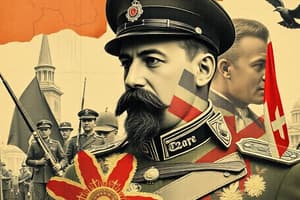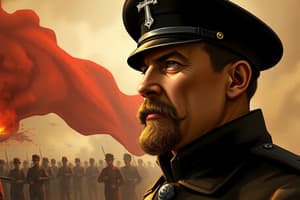Podcast
Questions and Answers
What was the initial state of the United Nations Command forces in response to the North Korean attack?
What was the initial state of the United Nations Command forces in response to the North Korean attack?
- They retreated to Japan for reinforcements.
- They were pushed back to a narrow perimeter around Pusan. (correct)
- They established a broad front across Korea.
- They advanced into North Korea significantly.
What strategy did General MacArthur employ to counter the North Korean forces in September 1950?
What strategy did General MacArthur employ to counter the North Korean forces in September 1950?
- He led an amphibious landing at Inchon. (correct)
- He called for an airstrike on the North Korean capital.
- He fortified the Pusan perimeter and awaited reinforcements.
- He ordered a full retreat to the southern coast.
What did the United Nations decide in October regarding the Korean conflict?
What did the United Nations decide in October regarding the Korean conflict?
- To move UN forces across the 38th parallel into North Korea. (correct)
- To negotiate a ceasefire with North Korea.
- To send additional forces to the United States for training.
- To remain defensive and not move beyond the 38th parallel.
What event significantly changed the course of the war in late November 1950?
What event significantly changed the course of the war in late November 1950?
What was the result of the UNC's advance toward the Yalu River?
What was the result of the UNC's advance toward the Yalu River?
What triggered the German request for an armistice in June 1940?
What triggered the German request for an armistice in June 1940?
What was the primary purpose of Operation Sea Lion?
What was the primary purpose of Operation Sea Lion?
Which event marked the beginning of the Allied invasion of Europe?
Which event marked the beginning of the Allied invasion of Europe?
What role did the Lend-Lease Act play for Britain during the war?
What role did the Lend-Lease Act play for Britain during the war?
During the Battle of Stalingrad, what contributed to the German defeat?
During the Battle of Stalingrad, what contributed to the German defeat?
What role did Kaiser Wilhelm II play in the escalation of World War I?
What role did Kaiser Wilhelm II play in the escalation of World War I?
Which factors contributed to the stalemate on the Western Front during World War I?
Which factors contributed to the stalemate on the Western Front during World War I?
What did the Allies achieve in North Africa by 1943?
What did the Allies achieve in North Africa by 1943?
What was the last major German offensive of World War II?
What was the last major German offensive of World War II?
What major event in 1917 significantly changed the dynamics of World War I?
What major event in 1917 significantly changed the dynamics of World War I?
Which countries did Soviet troops advance into after Germany's defeat in the east?
Which countries did Soviet troops advance into after Germany's defeat in the east?
What action did Austria-Hungary take following the assassination of Archduke Franz Ferdinand?
What action did Austria-Hungary take following the assassination of Archduke Franz Ferdinand?
How did the balance of alliances impact the onset of World War I?
How did the balance of alliances impact the onset of World War I?
What was the immediate consequence of Austria-Hungary's declaration of war on Serbia?
What was the immediate consequence of Austria-Hungary's declaration of war on Serbia?
What characterized the Eastern Front of World War I compared to the Western Front?
What characterized the Eastern Front of World War I compared to the Western Front?
What was the significance of the armistice signed on November 11, 1918?
What was the significance of the armistice signed on November 11, 1918?
What factor contributed to the resentment in Germany following World War I?
What factor contributed to the resentment in Germany following World War I?
Which treaty resulted in territorial losses for Bulgaria?
Which treaty resulted in territorial losses for Bulgaria?
What major outcome did the Treaty of Sevres have on Turkey?
What major outcome did the Treaty of Sevres have on Turkey?
Who was the leader of Germany after Hitler became Chancellor?
Who was the leader of Germany after Hitler became Chancellor?
Which ideology did Hitler emphasize regarding the German race?
Which ideology did Hitler emphasize regarding the German race?
What was Hitler's justification for the need of 'Lebensraum'?
What was Hitler's justification for the need of 'Lebensraum'?
What significant action did Hitler take in the mid-1930s that violated the Versailles Treaty?
What significant action did Hitler take in the mid-1930s that violated the Versailles Treaty?
Which two countries were focused on internal politics during Hitler's aggression?
Which two countries were focused on internal politics during Hitler's aggression?
What was the primary goal of the Schlieffen Plan?
What was the primary goal of the Schlieffen Plan?
Which city was the first major target for German forces in World War I?
Which city was the first major target for German forces in World War I?
What was the outcome of the First Battle of the Marne?
What was the outcome of the First Battle of the Marne?
What characterized the warfare on the Western Front after the First Battle of the Marne?
What characterized the warfare on the Western Front after the First Battle of the Marne?
Which major battle contributed to high casualties for both German and French troops in 1916?
Which major battle contributed to high casualties for both German and French troops in 1916?
What was the significance of the Battle of Tannenberg in 1914?
What was the significance of the Battle of Tannenberg in 1914?
What major challenge did Russia face on the Eastern Front from 1914 to 1916?
What major challenge did Russia face on the Eastern Front from 1914 to 1916?
What did Germany have to sacrifice in order to combat Russian forces on the Eastern Front?
What did Germany have to sacrifice in order to combat Russian forces on the Eastern Front?
Flashcards are hidden until you start studying
Study Notes
Assassination and Its Aftermath
- Assassination of Franz Ferdinand triggered tensions between Austria-Hungary and Serbia, igniting conflicts rooted in Serbian nationalism.
- Austria-Hungary sought German support, receiving a "blank check" assurance from Kaiser Wilhelm II before declaring war on Serbia.
Phases of World War I
- The war unfolded on multiple fronts: the Western Front (Germany vs. Britain, France, and later the U.S.) and the Eastern Front (Russians vs. Germans and Austro-Hungarians).
- Initial German advancements in 1914 led to stalemate and trench warfare on the Western Front, characterized by attrition tactics.
Significant Events in 1917
- U.S. entry into the war provided critical support to the Allies.
- Russia withdrew from the conflict following the Russian Revolution and signed a separate peace.
The Armistice and Conclusion of the War
- German spring offensive in 1918 was met with a pivotal Allied counterattack, leading to a retreat of German forces.
- The abdication of Kaiser Wilhelm II and the defeat of Germany's allies culminated in the armistice on November 11, 1918.
The First Battle of the Marne
- Occurred from September 6-9, 1914; Allied forces halted the German advance near Paris, leading to trench warfare on the Western Front.
- Key battles in 1916, including Verdun and the Somme, resulted in massive casualties, highlighting the brutal nature of the conflict.
Eastern Front Dynamics
- Russians initially invaded German-east with some success, but were ultimately thwarted at the Battle of Tannenberg in August 1914.
- Germany's commitment to the Eastern Front diverted resources from the Western Front, impacting their operational success.
Political Ramifications Post-World War I
- Resentment from the Treaty of Versailles contributed to political instability in Germany, setting the stage for World War II.
- The Treaty of Neuilly imposed heavy losses on Bulgaria, while the Treaty of Sevres led to significant strife and the rise of Turkish nationalism.
Rise of Adolf Hitler
- Adolf Hitler, emerging from the chaos of post-war Germany, established the Nazi Party and promoted the ideology of Aryan superiority.
- In 1938, Hitler’s annexation of Austria and the Sudetenland went unchecked, reflecting the weaknesses of European powers.
World War II Overview
- Spanning 1939-1945, World War II involved major global players: Axis powers (Germany, Italy, Japan) vs. Allies (U.S., Soviet Union, Britain, France).
- The conflict resulted in immense loss of life (approximately 50 million) and marked the largest military mobilization in history.
Key Battles and Events of World War II
- The Blitz, a German aerial bombing campaign against Britain, ultimately failed to achieve its objectives as the RAF repelled the Luftwaffe.
- The D-Day invasion on June 6, 1944, marked a significant turning point as Allied forces established a foothold in Europe.
Korean War Dynamics
- Initial North Korean aggression resulted in a UN perimeter at Pusan, followed by General MacArthur's surprise amphibious landing at Inchon in September 1950.
- UN forces advanced into North Korea, sparking a subsequent Chinese intervention that forced retreat back across the 38th parallel.
Studying That Suits You
Use AI to generate personalized quizzes and flashcards to suit your learning preferences.




